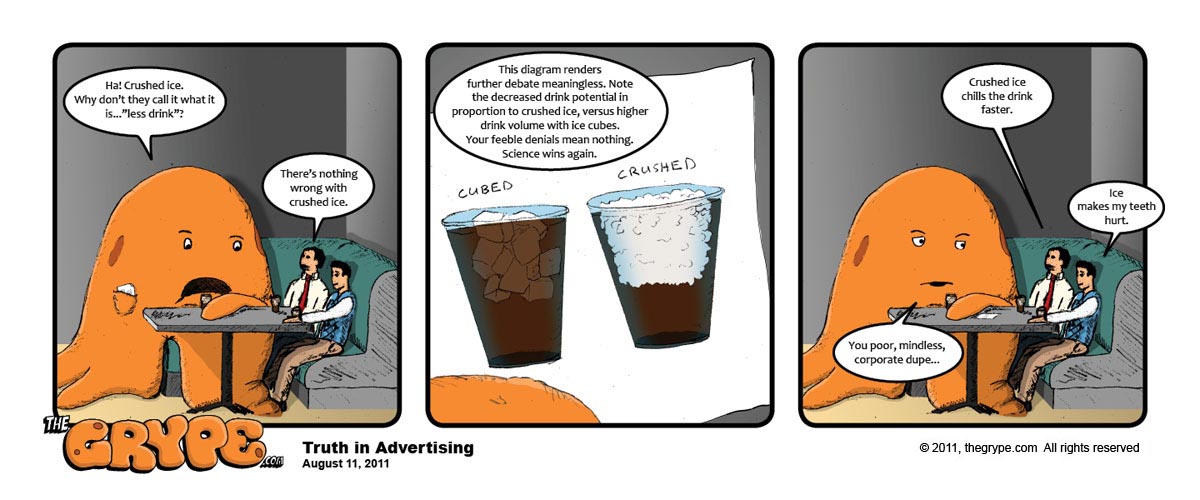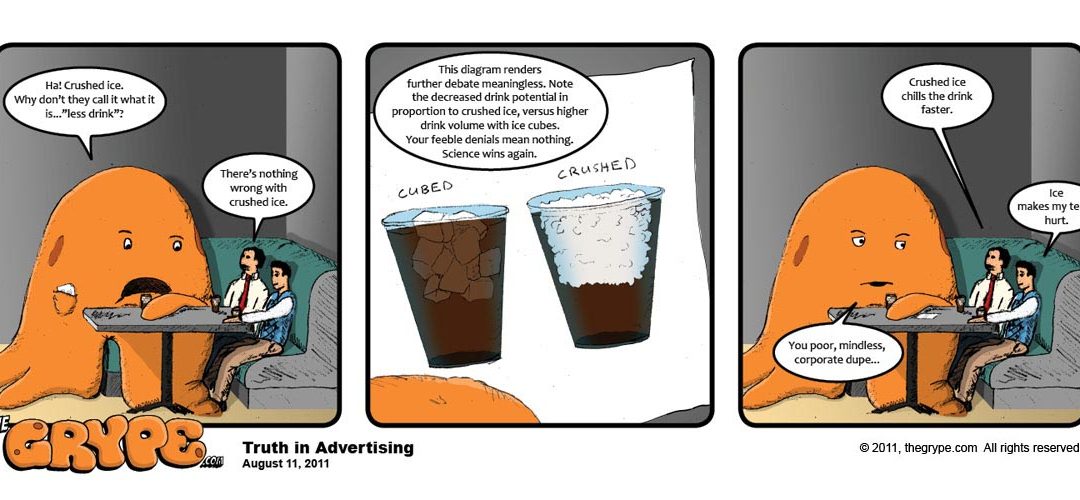 In the modern media arena of info-tainment, sponsor-produced media programming, and hyper-biased politically perspective-oriented news networks, the simple trait of honesty has become the most elusive quality in media communications. Nowhere is that as glaringly obvious as in the area of corporate advertising.
In the modern media arena of info-tainment, sponsor-produced media programming, and hyper-biased politically perspective-oriented news networks, the simple trait of honesty has become the most elusive quality in media communications. Nowhere is that as glaringly obvious as in the area of corporate advertising.
If an alien race is monitoring our television signals from another galaxy, it’s highly probable that—based on a comprehensive study of our broadcast advertising— they have definitively concluded the ultimate goal of everyone in our society consists of engaging in hours of viagra-assisted sex in the back seat of a sporty hybrid SUV with a barely-legal huge-breasted bikini-clad blonde cheerleader, punctuated by short rest breaks wherein we refuel by eating endless flame-broiled double-bacon cheeseburgers and microwavable snack foods washed down with gallons of cola-flavored soft drinks.
Corporate advertising has become nothing short of ridiculous, nor is there any force of reason or rationality on the horizon to curb the endless glut of corporate-sponsored bullshit being foisted on the general public. Why? Because there’s simply no profit to be had by enforcing truthfulness in business sales. In any corporate dogfight, truth is the first casualty.
In one extreme example, the owner of a company that uses late-night infomercials to sell a bogus penis-enlarging product— despite having recently been convicted of fraud and the swindling of hordes of customers— continues to rake in millions of dollars from behind prison bars because despite his own prison term, the law can’t stop his company from selling bullshit herbal placebos, or prevent his advertising department from continuing to lie to people.
The marketing industry fumbles along as it always has, relying on time-proven scattershot advertising techniques in which one throws everything at the wall to see what sticks. Postcard mailings, flyers, coupon-laden four color inserts; billions of trees bite the dust every year, ground up as fresh pulp for the direct-mail advertising industry, clogging countless mailboxes and wastepaper baskets and ultimately lining bird cages and cat boxes throughout our great land.
In this new digital age, we should perhaps be grateful for the massive corporate junk mail industry. It remains one of the primary sources of revenue for the U.S. Postal Service, whose hordes of blue-uniformed mail carriers dutifully stuff bag after bag of ad inserts and junk mail into our long-suffering mail boxes, day after day. It’s a long way from the Pony Express; but without all that corporate marketing money fueling billions of tons of ad fodder from the USPS, the Postal Service would be in even worse financial shape than it currently is.
Meanwhile hordes of corporate marketeers, desperate to hit upon “the cool new thing” or the latest bit of viral cleverness that appeals to the largest mass of viewers— consistently fall back on the trite and inane in their commercials and ad copy, perpetuating the oldest and stupidest of stereotypes— the ridiculously dumb sports-obsessed husband, the long-suffering verbally acerbic anal-retentive housewife, the ultra-snarky bratty kids and their clueless childlike parents, the glassy-eyed zombie consumer…
Okay. So maybe that last one has some validity. But if the average consumer has become prone to periods of slack-jawed zombie-ness, it might be because a lifetime of bombardment by the advertising industry with the most trite, insipid bits of ridiculous doggerel, scrawled across our brains in the screaming soundbytes and the tweet-length catch phrases which have become the cultural shorthand of our modern society, has allowed our brains to atrophy from disuse.
I wonder how long it will take for the marketing industry to realize that sometimes there IS such a thing as “bad” product recognition; that being assailed by inconvenient ads and commercials can (and often does) compel a consumer to label that product or company an enemy and swear off that product forever; and why there aren’t more attempts at helpful ad targeting, rather than antagonistic “force them to watch our ad” blast campaigns.
Some might say it’s paranoid to assume that consumers are under constant mental attack 24/7 by the mind-bending campaigns of corporate advertising. But those who work in that field know better.
Ever gotten a corporate jingle stuck in your head for hours at a time, like an unwelcome mnemonic invader? Someone elses thoughts, recorded into your brain, running over and over like a car alarm endlessly going off in your cranium?
Just so you know: the marketing suits pay extra for that.

